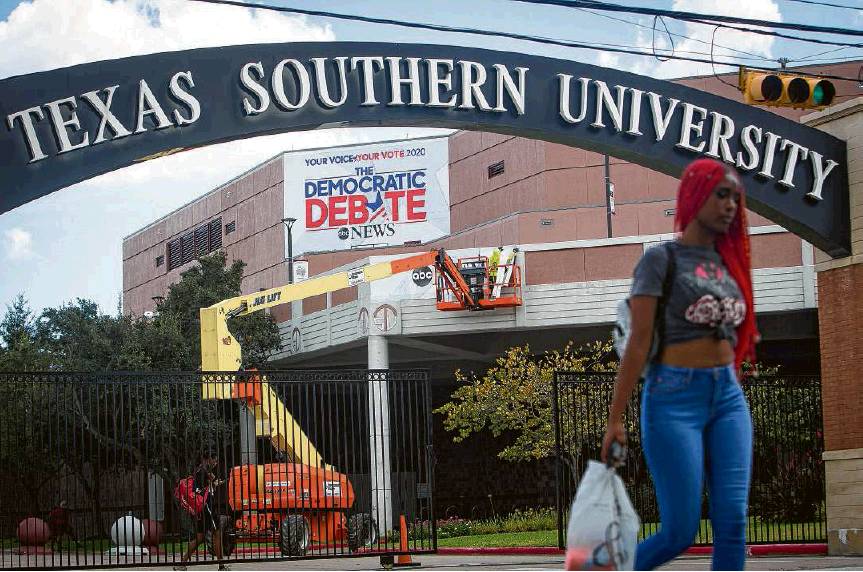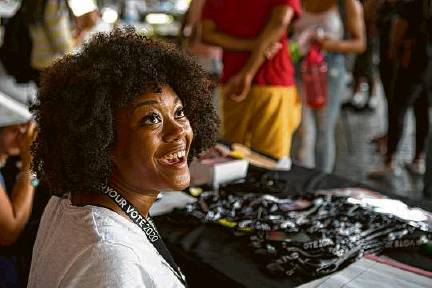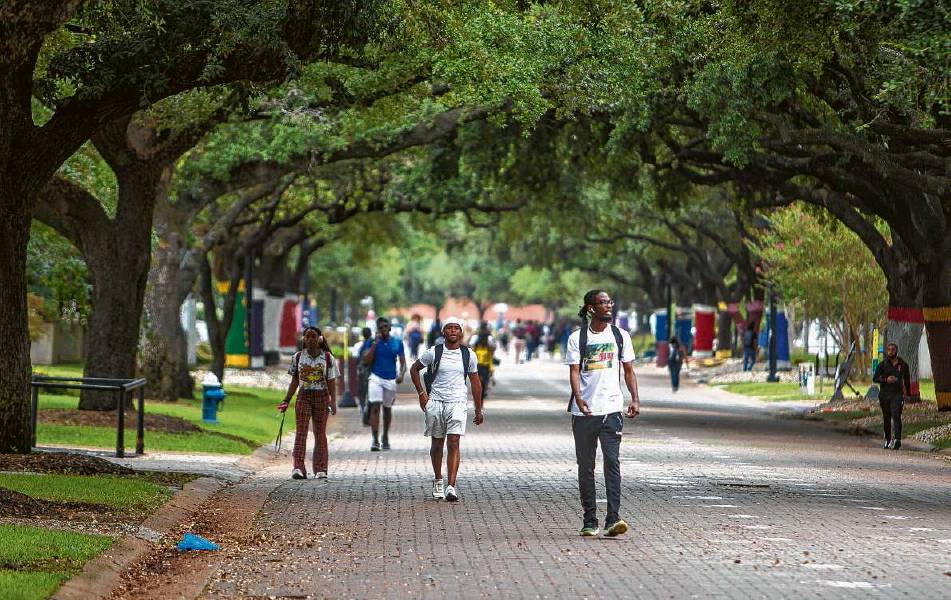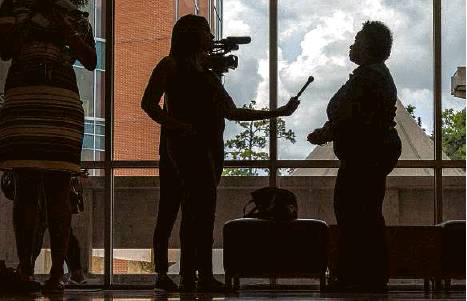CAMPAIGN 2020
Debate brings buzz to Houston, TSU
EXPOSURE: Historically black school revels in chance to show off city’s diversity, economy on national stage
By Brittany Britto STAFF WRITER
Days before the Democratic primary debate at Texas Southern University, the excitement on campus was palpable.
University staff buzzed around school grounds helping with finishing touches, ABC employees finalized credentials, and several TSU students — hired as ABC interns — were running to and fro, helping prep for the event and the 3,500 people who will flock to TSU’s Health & Physical Education Arena on Thursday to hear 10 Democratic presidential candidates.
The spotlight is on the city’s historically black college and on Houston, which is once again hosting a nationally televised debate.
“It’s been a lot of work honestly,” said Harrison “Radio Richh” Richmond, a graduate student studying professional communication and business media. He is also the program director for the university’s student-run streaming radio station, KTSU2. “It’s kind of crazy to see it all happening and coming together.”
Like Richmond, student interns have been working under ABC employees and executives since Aug. 26 as “runners,” assisting with running errands, contacting local vendors, making recommendations, setting up lunches, and purchasing last-minute essentials, like extension cords and surge protectors, to make the day goes smoothly, he said.
“Although our job is kind of small, it’s actually a big piece to the puzzle,” Richmond said.
TSU students, staff and the greater community believe the debate will raise the national profile of the HBCU.
“The very fact that people from all over the country and the media will be converging at TSU and the city of Houston, it’s a tremendous plus for us,” said Houston Mayor Sylvester Turner.
He said it gives the rest of the world a chance to see what Houston residents already know: the city has a booming economy, an alluring restaurant scene, and a high-level of diversity.
“Houston, in many ways, is kind of a microcosm of many of the issues that are impacting (the country) on a national level, and (the candidates) get an opportunity by debating, visiting and being in this city, to touch on so many constituents that exist in the United States,” Turner said.
Houston is tackling pertinent national issues like climate change, infrastructure (especially following Hurricane Harvey), immigration and refugees, technology and health care, Turner said.
“We’re more than just the energy capital of the world.”
High demand, exposure
Houston has been a hub of sorts for presidential hopefuls.
TSU welcomed Sen. Kamala Harris, D-Calif., for a rally in March, and then eight Democratic presidential prospects in April for a forum on women of color. And in July, 10 Democratic candidates visited the George R. Brown Convention Center for an event hosted by the National Educators Association, the country’s largest teachers union.
The Republican Party held a debate with its presidential candidates at the University of Houston in 2016, just days before the Texas primary.
Houston was also chosen as a finalist to host the 2020 Democratic National Convention, but party leaders ultimately chose Milwaukee.
Of the thousands of people who will attend, about 650 students have received tickets, making the university’s presence at the debate — to include faculty and staff — a little more than 1,000, university spokesman Steve Scheffler said.
Of those who can’t make it but still want to be a part of the action, about 1,500 students, faculty, staff and community members will attend a free, ticketed watch party in the school’s auditorium. Those tickets have, however, already sold out, Scheffler said.
The desire to get tickets for the event reflects the interest and intensity as the country moves into the fall and prepares for the Democratic primaries in March, said Turner, who interpreted this as a great sign for Texas.
“We’re not just a donor state when it comes to contributions,” Turner said. “We are in play … We are a competitive political state.”
The type of exposure the debate brings is invaluable, TSU President Austin Lane said.
“You couldn’t pay for this type of exposure,” said Lane, adding that there will be special TSU signage, branding and ample mentions of the college during the debate. “It would cost millions of dollars to be able to advertise something like this.”
But more than that, Lane says TSU is a natural fit for such an event, especially since Texas designated the university as an institution for urban programming in 1972.
TSU students, officials and the mayor agree that the debate will help build the university’s national profile. It is the second largest HBCU in the country and educated the late U.S. Reps. Mickey Leland and Barbara Jordan, gospel singer Yolanda Adams, and former NFL player and TV personality Michael Strahan.
Lane said a leasing deal with ABC was initially put in place after Strahan, who started his athletic career at TSU, put in a good word for the university. Strahan’s influence helped create the partnership TSU has with the television network. In June 2018, TSU hosted another ABC event: a charity basketball face-off between U.S. Sen. Ted Cruz and TV host Jimmy Kimmel.
“It helps to have that kind of support at that level,” Lane said.
Students benefit
Part of the school’s leasing agreement with ABC includes internships for students, of which at least 30 have been hired as “runners” for the cast, production, and technology crews, Lane said.
“Our students are right in there with them,” Lane said. “You can’t beat that.”
Some students are using the debate as an opportunity to flex their muscles in journalism and communications.
Lane said the university’s broadcast radio and TV stations, including TSU TV, KTSU radio, and KTSU2 will provide coverage and have their own “spin rooms” along with professional media.
As an intern for ABC, Tamerras Leonard, a senior broadcast journalism student, said she has the opportunity to work under executive producers, assisting with different facets of production, including issuing credentials and helping on-stage. ABC employees have attempted to tailor student experiences to what they want to do with their career, she said.
On debate day, An’Jonae Woodson, a grad student studying communication and digital media, will be a correspondent and work in the spin room creating news packages for TSU TV and university radio stations.
“It’s good that (students will) be able to experience this, because how often is a debate on a college campus? An HBCU, at that,” Woodson said.
Richmond, the radio station program director, agreed.
“What’s pretty unique is we’re being afforded the opportunity to rub shoulders with the best that ABC has to offer,” he said. “So although we’re kind of on the entry-level position end of things, it’s still great to be in the environment, ask questions and build relationships with individuals that could possibly take you to the next level.”
Nonpartisan campus
Despite the Democratic debate being hosted at TSU, Lane stressed that the university, as a public institution, is nonpartisan. TSU has and will continue to host people of diverse political views at the campus to speak at classes and events — be they Republican or Democrat, left or right, he said. Doing so allows the university to expose students to a range of dialogue and beliefs.
“That’s the beauty of higher education,” he said. “That’s something our university has been known for throughout the years, and it just enhances what we’re trying to get across to students and to prepare them for the world.”
Still, students are excited about what it means to have presidential candidates —which together represent a diverse demographic — at their college.
Austin Nguyen, a second-year law student, said seeing a female candidate of color like Kamala Harris, an openly-gay candidate like Pete Buttigieg, and an Asian male candidate like Andrew Yang, means more to a campus like Texas Southern.
It makes him feel that students; and minorities; voices are heard and that they matter, he said.
“That’s what diversity means,” Nguyen said. “That’s what our school is a symbol of.”
And to have that nationally showcased: “It’s exciting,” he said.
Zach Despart contributed to this report. brittany.britto@chron.com



